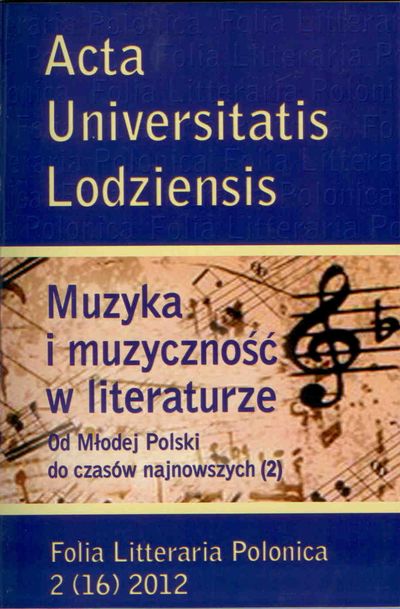Muzyka jak Ocean. Novecento Alessandra Baricco w kontekście porównawczym
DOI:
https://doi.org/10.18778/1505-9057.16.03Abstrakt
Elżbieta Zarych presented the Italian writer and musicologist’s famous monologue in the context of his other literary and theoretical books, literary and musical works that served as his inspiration, as well as, contemporary pieces which deal with the same topic. The author of the dissertation, while considering the music and melody of Baricco, focused on pieces that possess the two principal topics: ‘music’ and ‘sea.’ Baricco wrote ‘the sea is the music’ and in the monologue Novecento they both are connected in the highest form. The author presented the conception of Baricco who, in order to avoid classifying his work into literary genres, wrote just ‘stories’ while connecting the literature, the music and the painting into the ‘white music of a story’. She also presented Barrico’s concept of real and ideal music in the context of his multi-level plot and the Novecento composition. Furthermore, the author analyzed the jazz quintet accompaniment composition for the Novecento monologue written for the Italian actor Eugenio Allegri, as well as, explored the realized and unrealized ideas during the composition’s creation process. She attempted to characterize the imagination of Baricco who, using his musical knowledge, tries to concretize the plot of Novecento; the metaphors: ‘life is a navigation’, ‘a sea is a music’, and ‘a story is a music and a sea’, as well as, describe the life of an ideal and genial musician Danny Boodmann T. D. For Lemon Novecento, life is music and music interprets reality. The author showed that for Baricco too, music is something real and normal, and for this reason in Novecento he tells the story of real music – jazz, played in real time on a real traveling ship.
Pobrania
Pobrania
Opublikowane
Jak cytować
Numer
Dział
Licencja

Utwór dostępny jest na licencji Creative Commons Uznanie autorstwa – Użycie niekomercyjne – Bez utworów zależnych 4.0 Międzynarodowe.











